In a recent poll by Thomas Reuters Foundation, India was ranked as the least safe country in the world for women, discerned as having the worst record of rapes, sexual harassment and violence against women.
This poll might be hard to believe for many Indians, but the truth is that we live in a culture that normalises rape, violence and harassment against women. Rape culture refers to the tendency of seeing violence and misogyny as an expression or part of ‘tradition’ or ‘culture’ and begins with our everyday use of sexist language and glorification of sexual violence in popular culture.
Degradation of women, evident through numerous incidents such as eve-teasing (street sexual harassment), groping, flashing, revenge porn, stalking, among others, is a consequence of day-to-day normalised sexist behaviour. They are a result of certain actions and beliefs that normalise rape.

Violence against women does not take place in isolation; it is a part of systematic rape culture. It starts with normalisation of rape and sexual assaults, leading to degradation of women, which finally perpetuates into more violent and sexual assaults. Actions and attitudes we term as ‘harmless’ and ‘not related to rape’ are in fact part of this structure and reinforce, as well as excuse, more violent sexual acts.
Rape culture is defined as a sociological concept for a setting in which rape is pervasive and normalised due to societal attitudes about gender and sexuality. This term was coined during the second wave of feminism, in 1970s, to counter the normalisation of sexual violence against women in the society.
It conditions women to live in fear of their safety, which limits their behaviour. This is how rape functions as a powerful tool of oppression to hold women in subordination to the male population, even though ‘not all men’ are rapists. It is this cycle of fear that constitutes the rape culture.
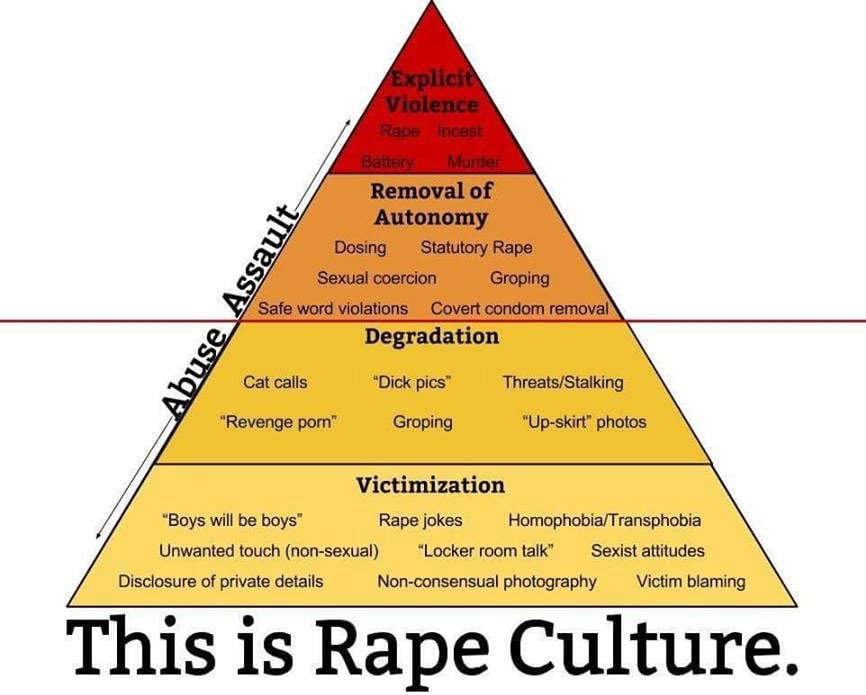
Image Source: Medium
Here are five prevalent everyday examples that perpetuate rape culture.
1. Rape Jokes
Rape jokes are not harmless. Neither are they ‘just jokes’.
When we establish a link between humour and rape, we condition the audience to ignore and even normalise sexual assault. Jokes about traumatising events, masked as ‘humour’, defends the behaviour of the abuser as ‘normal’ or ‘regular’.
We cannot sell humour at the expense of the victim. The seemingly ‘innocent jokes’ represent and perpetuate oppressive ideologies, that feeds and sustains rape culture. By discrediting and silencing the trauma of the victims, this kind of humour makes sexual assault and rape a laughing matter.

Such kind of jokes present rape as not a violent and criminal act. Image Source: Rebloggy
Rape is a horrendous and persisting crime. Jokes about it brings up excruciating experiences for victims, who feel largely isolated from people who have never experienced sexual trauma. It makes rape looks like something which is ‘not that bad’.
Similarly, when we draw parallels between rape and something that it inconvenient for us, for the purpose of humour, we present rape as not a heinous or violent act. So many times I have heard my classmates coming out of an examination hall and saying things like, ‘that exam raped me’, presenting rape as trivial as a difficult exam.
During the shooting of Sultan, Salman Khan said that he ‘felt like a raped women’. He used rape as an analogy to explain the extent of the physical labour he indulged in and completely disregarded the physical and mental trauma a rape victim goes through.
We even use rape as an analogy to describe defeats in sports. In the semi-finals of the 2014 FIFA World Cup, when Germany defeated Brazil with a score of 7-1, Twitter was flooded with tweets saying that ‘Germany raped Brazil’. Or, how about the hundreds of posts on social media that talk about how ‘Pakistan was raped by India’, after India wins any cricket match against Pakistan. All these are examples of how we trivialize rape.

Image Source: The Express Tribune
This normalisation of rape and sexual assault perpetuate rape culture. Rape humour and jokes dial down the intensity, criminality and atrocity of rape, along with isolating the victims who become hesitant to share their experiences.
2. Victim Blaming
Victim blaming marginalises the victim and makes it difficult for them to report an abuse or sexual assault. A society which holds victims responsible for the atrocities they suffered, does not make the victims feel safe and comfortable in coming forward and talking about it.
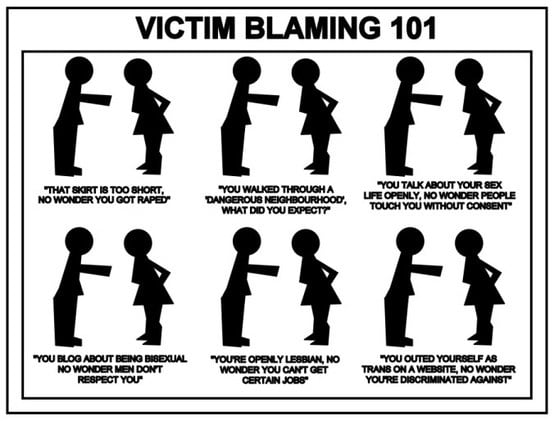
Image Source: Our Stories Untold
Mukesh Singh, one of the men convicted for the December 2012 gang-rape and murder in Delhi, in an interview in the documentary India’s Daughter, justified the rape on the grounds that the victim ‘overstepped’ the lines prescribed to feminine gender roles and said that a woman is responsible for rape. Even his lawyer recapitulated similar victim blaming opinions, and went to the extent of saying that he would burn his daughter alive if she behaves in such a ‘dishonourable’ manner.
However, blaming the victim, for any kind of sexual assault, leads to the notion that rape is something that is prevalent and normal in the society, and it’s an individual’s responsibility to ‘protect’ themselves. Such an attitude, that normalizes and excuses sexual violence, does not hold the abusers responsible for their actions.
A part of victim blaming attitude can be attributed to the fact that when you ask questions like, ‘What were you wearing’ or ‘Why were you out so late in the night’, you try to separate yourself from the victim. When people find faults in the victim, something they would never do, they try to establish the fact that they are safe and that they won’t ever be in a similar situation.
By such kind of victim blaming attitudes, society reinforces a relationship between the abuser and the abused, which allows abuser to perpetuate sexual violence and diminishes all accountability of their actions.
3. Toxic Masculinity
Toxic masculinity essentially refers to the beliefs and expectations, revolving around aggression, repression and stoicism, which dictate how a ‘real man’ should behave.
Toxic masculinity is inherent in rape culture and a patriarchal society. It is something that men learn over the years through various sociocultural conditioning. Rather than implying that ‘all men are toxic’, it refers to cultural norms that equate masculinity with control, violence and aggression.
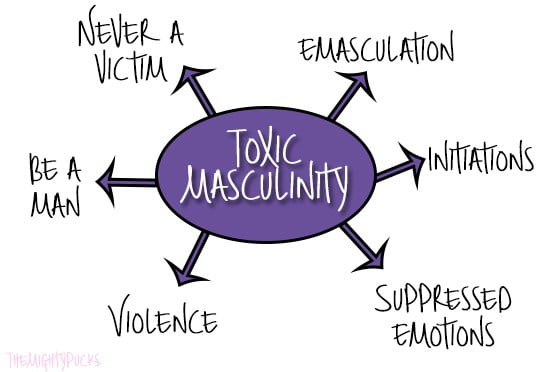
Image Source: MythWoman
Toxic masculinity is based on gender norms which validate men as sexual predators and women are objectified in order to legitimise their ‘manhood’. Sexual control over women is seen as a ‘territory’ to be conquered. As a result men feel sexually entitled to women’s bodies as a way to prove their ‘manliness’.
Toxic masculinity identifies women as inferior and subordinate to men. Thus, its response to female empowerment is repression through physical and sexual abuse. Even being rejected by a women, for any kind of sexual encounter, leads to violent sexual abuses. Toxic masculinity feeds rape culture to an extent that rape is seen as a means to ‘control’ women.
Toxic masculinity will continue to fortify rape culture till the time masculinity will be defined by sexual ‘conquest’.
4. ‘Men will be Men’
The notion of ‘men will be men’ allows men to believe that their actions will be excused. It is based on the concept that biology is primarily responsible for their actions, and as a result, men have no control over their actions. Proponents of this notion go as far as to say that men are naturally prone to rape and criminal behaviours thus perpetuating rape culture.
Mulayam Singh in one of his political rallies, while addressing the issue of rape laws, said that ‘men make mistakes’, thus, excusing the actions of rapists as just a ‘mistake’.
When society reinforces such ideas, it frees men from being answerable for their actions and puts on women the pressure to ‘save’ themselves from ‘inherently’ violent actions of men. This implies that since men will act in a violent way, because they cannot control their actions, it is primarily a women’s responsibility to not ‘indulge in activities’ which might make them victims of sexual violence.
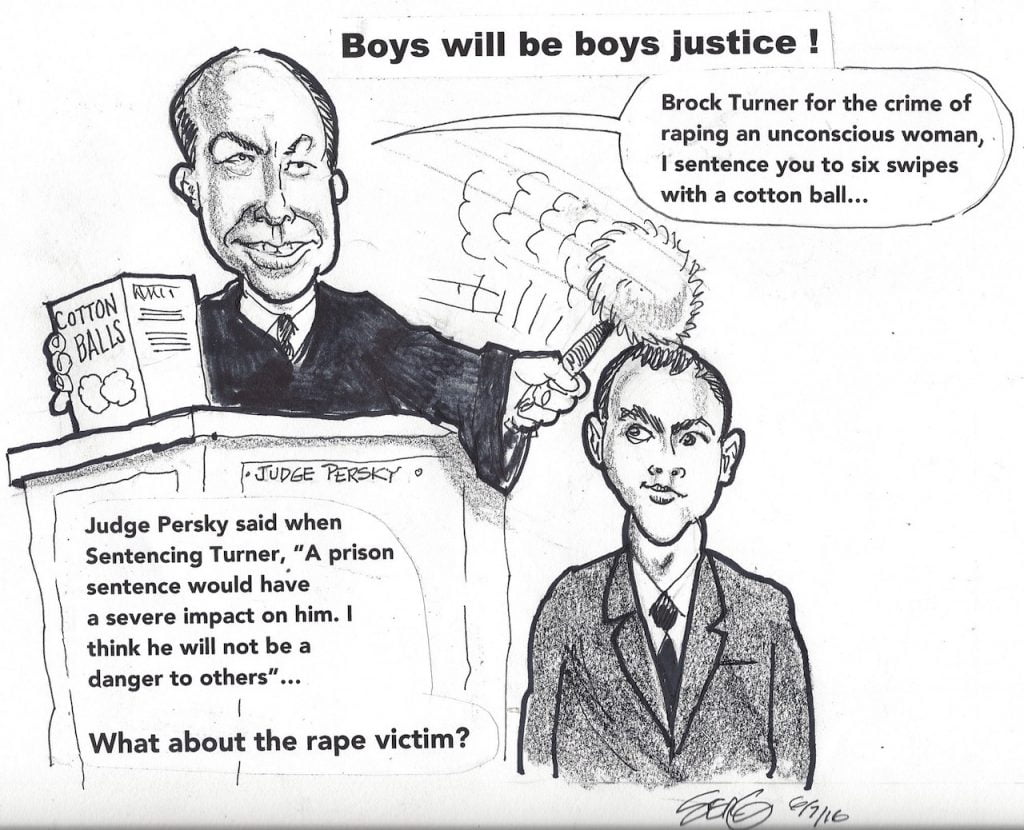
Image Source: Pocho.com
The point is, ‘Men will be Men’ is a notion that will continue to exist, if we refuse to address sexist remarks and issues, if we don’t teach men that they are responsible for their actions, and if we continue to aid appalling behaviour. The notion will continue to sustain rape culture if we do not hold men accountable for their actions and refuse to tolerate inappropriate behaviour that is considered to be normal and something ‘men will do’.
5. Objectification of Women’s Bodies
Rape culture also includes objectification of women’s bodies, which reduces women to objects. It is prevalent everywhere – advertisements, social media, television, movies among others.

Image Source: Dazed
Sexual objectification contributes to toxic gender stereotypes that justify violence against women. Women learn that their appearance and the way their body looks is of utmost importance and is something that men find most ‘desirable’. Our obsession with appearances and how they cater to the needs of men, turns women into objects. When we inherent the fact that an entire gender is solely for satisfying needs, it dehumanizes millions of women and rejects their identity.
Objectification implies control and ownership. It is difficult to have empathy with someone we don’t consider or view as a ‘real person’. The problem with objectification is that it limits women to their bodies, reducing their value as a human being, leading them to be more vulnerable to gruesome and sexual violence.
6. Placing ‘Honour’ In A Woman’s Vagina
In India one of the biggest perpetuators of rape culture is the fact that a family or community’s honour is tied to a woman’s sexual ‘purity’. Her body is treated as a sacred thing. Rape culture is dishonouring the victim and not the rapist, because women are seen as the ‘honour’ of the community.
Rape is described as izzat lutna (robbing one’s honour) in Hindi, which depicts rape as something that ruins the life of the victim and her community. When a woman is seen as a source of ‘honour’ they are made exceedingly vulnerable. Their actions are strictly controlled and policed by their families and communities, and they are also seen as a target by those seeking revenge from the community.
Rape is viewed as a powerful way to seek revenge because it is associated with notions such as disgrace and shame. Rape and the stigma attached to it makes it hard for women to seek justice, because most of the time they don’t report the crime fearing dishonour.
Lastly, what the concept of honour does is to limit the activities of women – they are made responsible for saving the community’s honour, making rape as something which is natural form of ‘punishment’ when a community’s honour is transgressed.
These are just some of the examples of everyday sexism that contribute towards the normalisation of rape. Unchallenged and widespread sexist attitudes and behaviours create a structure where sexual harassment is normalised, paving way for violent sexual abuse and rape. Rape culture is not a hypothetical idea created by some ‘hypersensitive feminists’. It talks about the prevalence and normalisation of sexual violence in a society.
Featured Image Source: Redandblack.com
About the author(s)
Prerna is a history undergrad student who spends most of her time reading, dancing and arguing why everyone should be a feminist.
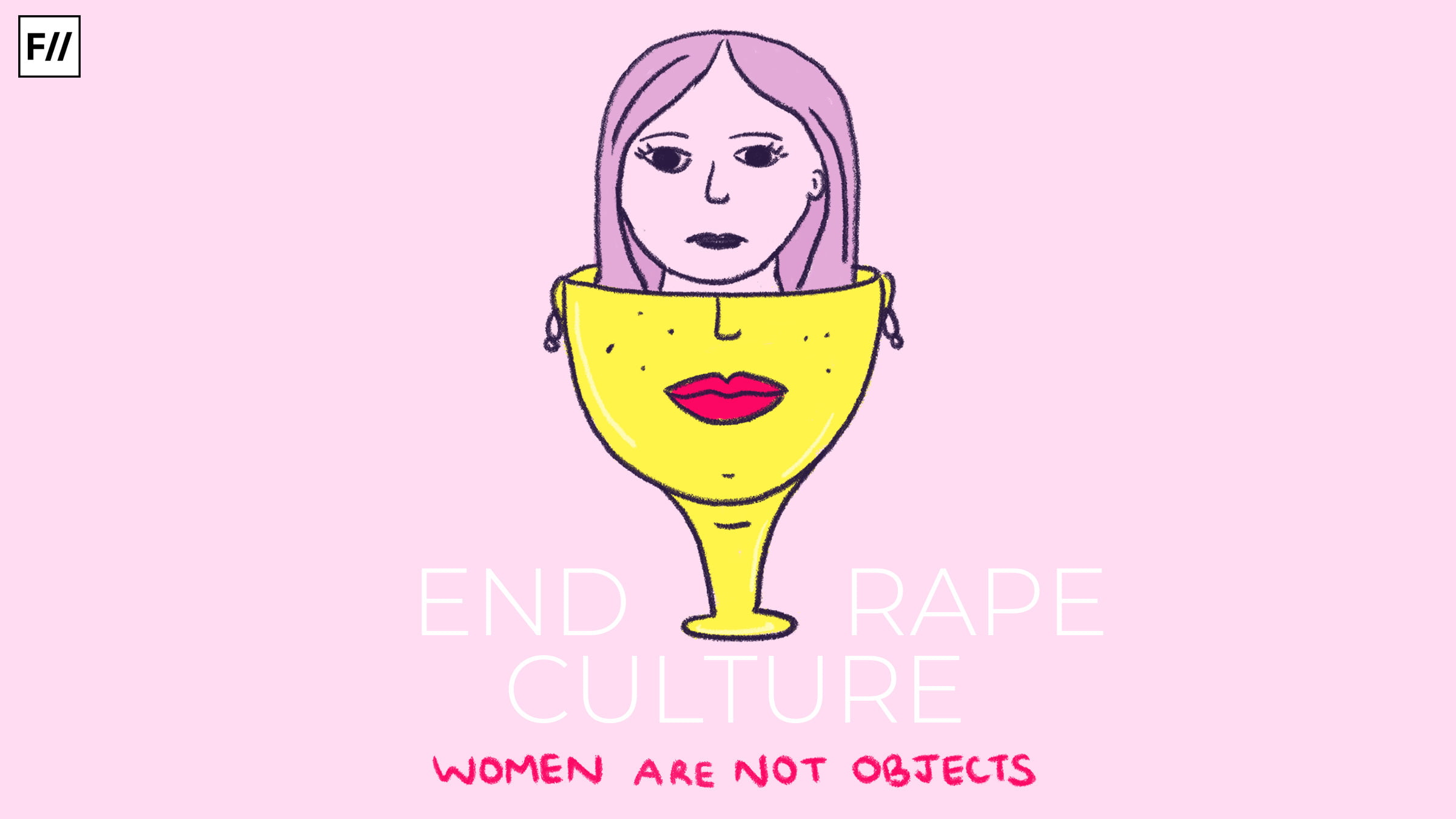




Hey feminists – you DO realize that MEN can get raped too right ?
Rape is not somehow an exclusive and proprietary crime of “men against women” – men as just as much, if not more victimized by the same yet don’t WHINE about it even a fraction as much as feminists do.
Male Rape is common in prisons, military barracks and most residential institutions – yet not a single law or lawmaker has uttered one word about this.
But instead we have feminists devise cute little pyramid charts about how “mean” men are to them and how its being “normalized” because it doesn’t impact men.
This nefarious attempt to demonize men under the rubric of “patriarchy” is perverse , disingenuous and utterly perverse . Men are born into patriarchy just as much as women are – yet apparently the onus is on men to “explain themselves” ?
Everyday “sexism” is this kind of “feminist BS” published here that seeks to demonize an entire gender for simply having been born into a system they never had a say in while it also serves as a convenient excuse for the impotence and cravenness of women to stand up for themselves when they are threatened. I wonder if a man printed a such a onesided woman hating screed how much sympathy he would get in the media ? And apparently this farce is the “equality” of feminists.
Did anyone say or suggest that men don’t get raped too? Then I don’t understand why do you feel the need to bring up the topic when the article is in context of women. No one is insinuating that men don’t get raped but the topic of the article is about women and not men. If you want an article for male rape victims so badly then go and write one yourself.
Excellent article on rape culture. Thanks FII. I agree with the gentleman who has responded and said men AND boys also get raped, they are also born in patriarchy and suffer it oon many ways. They are also boxed in to gender. I will add, that women can be and ARE patriarchal. Many feminists say the above all the time but some people do not hear that!! I wish to add that we feminists are not WHINING about rape. We are CONDEMNING AND OPPOSING IT. It will be really good if men would also break their silence and oppose it, Brother.
Rape is allowed in Islam if it is against non-Muslim. Definitely Muslim make joke about rape such as Salman Khan, football fans.
Very illuminating. Thanks for giving a concrete shape of such an ideological ‘abstract’.